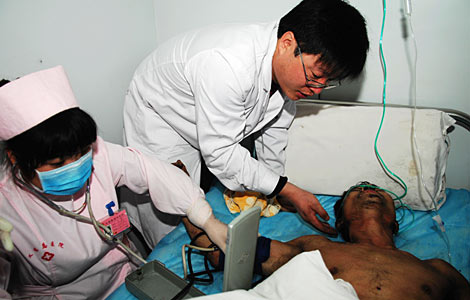Thai floods leave 5,300 jobless
Updated: 2011-11-05 18:16
(Xinhua)
|
|||||||||||
BANGKOK - More than 5,000 people have lost their jobs as more than 20,000 companies in 16 provinces had been hit by floods, Bangkok Post daily newspaper reported on Saturday.
Athit Ismo, the director-general of the Labour Ministry's Department of Labour Protection and Welfare, said more than 20,000 companies employing over 790,000 people in 16 provinces had been hit by floods.
Flooded firms have laid off more than 5,300 employees, including workers in Bangkok and central province of Nonthaburi, said Athit.
Floodwater has not yet reached Bangchan Industrial Estate in Bangkok's eastern Min Buri district. About 60 percent of factories in the estate are operational while the rest have halted production, he said.
Earlier all seven industrial estates were under water, costing economic damage of at least $4.9 billion. Five are in Ayutthaya, the Hi-Tech, Bang Pa-in, Rojana and Factoryland parks, while the other two, Nava Nakorn and Bangkadi, are in Pathum Thani province, north of Bangkok.
In the meantime, 10 Japanese companies with flooded production facilities in Thailand plan to send around 2,000 Thai workers to Japan to work there temporarily, said permanent secretary for labour Somkiat Chayasriwong.
More than 720 Japanese companies in Thailand have been affected by the flood crisis. Among them, 450 companies are in industrial estates.
Some of the larger Japanese firms planned to send their workers to Japan. The move would enable their Thai workers to earn wages, and also help their Japanese employers increase productivity during the flooding crisis.
Ten Japanese firms sought permission from the Japanese government recently to send 2,000 Thai employees to work temporarily in Japan for six months, according to the Bangkok Post.
The country's worst floods, caused by heavy monsoon and overflow from several dams in upper part of the country, in nearly 60 years has claimed more than 400 lives and affected almost 10 million people since mid July.
Hot Topics
Libya conflict, Gaddafi, Oil spill, Palace Museum scandal, Inflation, Japan's new PM, Trapped miners, Mooncake tax, Weekly photos, Hurricane Irene
Editor's Picks

|

|

|

|

|

|







